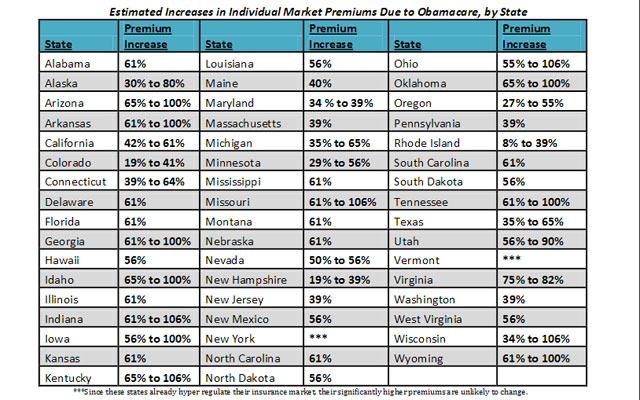Obamacare: Projected Premium Increases by State
By
Alyene Senger
Heritage.org
Newscom
Remember that repetitive presidential
promise
to “cut the cost of a typical family’s premium by up
to $2,500 a year”? As 2014 and full implementation
of Obamacare get closer, it is crystal clear that
won’t be the case.
Obamacare’s most onerous insurance regulations will
directly cause insurance premiums to skyrocket,
particularly in the individual and small group
markets.
While there are many provisions that will increase
premiums, two will have the most expensive impact:
-
Age rating restrictions.
Obamacare limits variation in premium costs to a
ratio of 3 to 1 based on age. But as
Heritage research
shows,
“The natural variation by age in medical costs
is about 5 to 1—meaning that the oldest group of
(non-Medicare) adults normally consumes about
five times as much medical care as the youngest
group.” This means that under Obamacare, young
adults will pay significantly higher premiums
than they would have prior to Obamacare, and
older adults will pay only slightly lower
premiums.
-
New benefit mandates and
cost-sharing rules. Heritage expert Ed
Haislmaier
explains,
“The new law adds a number of health care
services that insurers must cover and in some
cases restricts the ability of insurers and
employer self-insured health plans to impose
limits on the amount of services patients can
consume. This combination will drive up health
plan costs and premiums for both individual
insurance and employer-group coverage.” In
addition, Obamacare prohibits cost sharing on
many preventative services, which will
dramatically increase utilization of those
services—pushing premiums even higher.
There have been many different
studies done over the past few years to model what
premium increases are likely to be under Obamacare’s
new rules. The majority staff of the House
Energy and Commerce
Committee
worked with two Senate committee staffs to compile
over 30 of them to make a list of projected premium
increases by state:
Source: “The Price of
Obamacare’s Broken Promises,” report by the House
Committee on Energy and Commerce Majority Staff,
Senate Committee on Finance Minority Staff, and
Senate Committee on Health, Education, Labor &
Pensions Minority Staff, March 2013.
Many Obamacare advocates
attempt to refute these premium increases by
pointing to Obamacare’s generous subsidy scheme. But
as the Hoover Institution’s Daniel Kessler
points out,
“This argument is misleading. It fails to consider
that the money for the subsidies has to come from
somewhere. Although debt-financed transfer payments
may make insurance look cheaper, they do not change
its true social cost.”
To that end, Obamacare’s
exchange subsidies are estimated by the
Congressional Budget
Office
to cost over $1.2 trillion over 10 years. And nobody
should be surprised that this is an increase over
the
initial (2010) projected
costs
for these subsidies.
With the bulk of the health care law kicking in
2014, this is likely just the beginning of
Obamacare’s broken promises.
Posted in
Health Care



